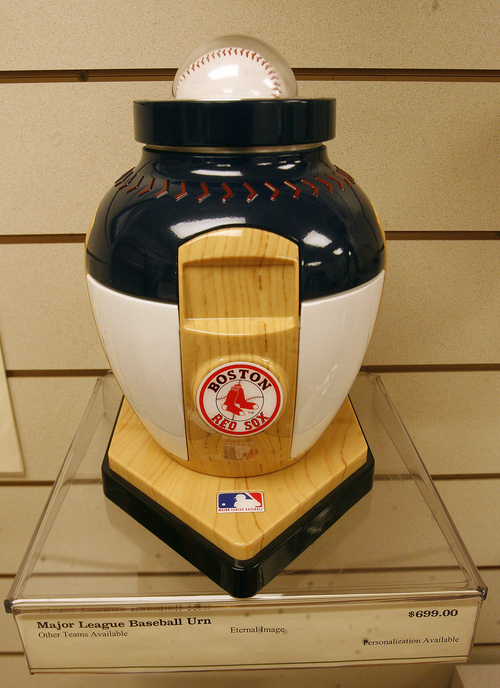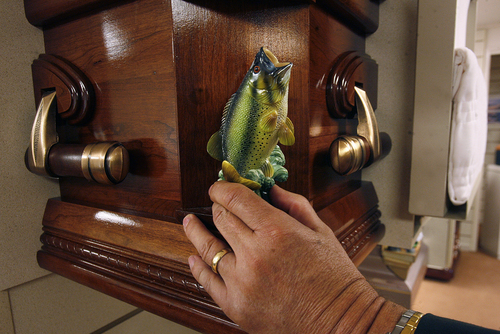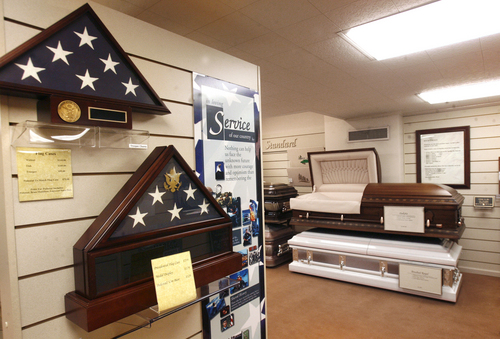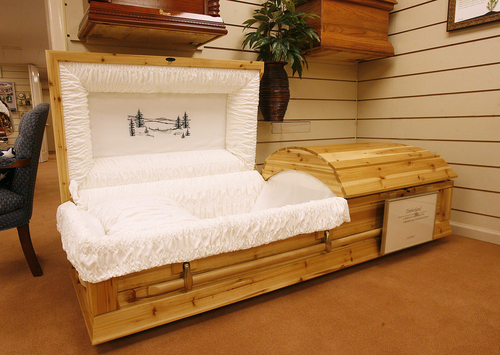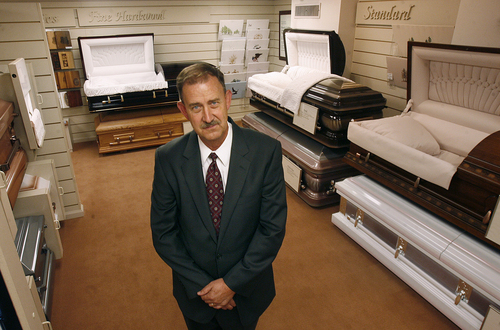This is an archived article that was published on sltrib.com in 2013, and information in the article may be outdated. It is provided only for personal research purposes and may not be reprinted.
Growing up, Kurt Soffe never doubted he'd be a funeral director someday.
The third-generation proprietor of Jenkins-Soffe Funeral Homes of Murray and South Jordan, Soffe remembers visiting his grandparents who launched the business in 1915, helping his father who inherited the business and learning when to be quiet.
"There is no other profession that I can think of where you're invited inside people's very personal private space … to help them put a little bit of salve on that raw emotional discharge," Soffe said. "To have them come back and say, 'I don't know what I would have done without you.' I thought, 'I want to be a part of that.'"
It's a noble view of what is admittedly a grim business, a business that apparently few care to think about before the inevitable occurs. A 2010 survey commissioned by the Funeral and Memorialization Information Council (FAMIC) revealed that while 66 percent of consumers want to make plans for how and where they are laid to rest, only 25 percent of that group has actually done it.
"We all know we're going to die, we just don't believe it, so we don't plan," Soffe said. "We're a death-denying society."
But denial doesn't make mortality — or the costs associated with death — go away. A 2010 survey by the National Funeral Directors Association (NFDA) showed the average American funeral costs $7,045. That's up from $5,180 in 2000 and $1,809 in 1980.
From embalming and cemetery fees to the price of caskets, funerals can be expensive, so it pays to plan ahead, said David Hess, director of the Mortuary Science program at Salt Lake Community College.
"This is a service industry," Hess said. "What you have to understand in running a small business is we have costs."
—
Planning a traditional funeral • Cremation or burial? Embalming? A memorial service? Type of casket? Limousine or hearse service? Flowers? Between these options and cemetery fees, obituaries, death certificates and burial or cremation permits, it all adds up. Depending on your preferences, funerals can run from a low-key basic $700 cremation to a $10,000 blow-out event complete with fireworks and a parade.
It may seem macabre or taboo to broach these subjects in polite company, but consumers should raise these issues with loved ones at some point since there's a fair bit of money attached.
By law, funeral homes must offer complete price lists of their services upon request and because of the range of services and options available, the Federal Trade Commission (which regulates the funeral industry) advises shopping around. You can walk into an established mortuary and ask for a published list or call ahead for pricing. Many Utah funeral homes also post itemized pricing information on their websites.
Writing down your expectations, mapping out expenses and starting to save either in a dedicated funeral savings account or through prepaying for services can give you and your loved ones peace of mind when the time comes.
But a word of caution on prepaying for funeral services: Understand exactly what you're paying for, where the money goes before you die and if interest accrues, and what happens if you change your mind or if the funeral home goes out of business. Read the prepay contract carefully to make sure your wishes are carried out.
And don't forget to share your plans and expectations with your family. If they aren't aware of your prepay plan or can't find the paperwork, they may end up forking over cash for something you've already bought and paid for.
—
Another way • In 2007, Kathleen Owen and her husband William served an LDS mission to New Zealand, and during their visit, they attended four funerals. They marveled at the simple caskets, the tradition of holding the viewing in a home instead of a mortuary and the natural appearance of the non-embalmed deceased.
So when William Owen died in 2011, Kathleen tried to replicate that natural experience. She used dry ice to keep her husband's body cold as required by Utah law. She bought a carved wooden casket fashioned by a local carpenter instead of a standard metal coffin. And she held a viewing in their Harrisville home before the burial, choosing to hold the official memorial service after the interment.
"It was very comfortable to share experiences right in the home," Kathleen Owen said.
But there were awkward moments.
William Owen had originally wanted to be transported to the cemetery in a son-in-law's pickup. When that raised eyebrows from the neighbors, Kathleen chose the more conventional hearse.
"There are a lot of misconceptions about what's healthy to do and what's legal to do," she said. "One of the things is having the confidence to break from the norm."
Now a volunteer with the Funeral Consumers Association of Utah, Owen advocates having the funeral you want to have and tutors those interested in do-it-yourself funerals.
"We have no objections to funeral homes and for most people. They're still going to want to use the funeral home and have a conventional burial," she said. But "it's very empowering for people to realize that they can have a simple, inexpensive funeral. The main thing is to talk with your family about it."
—
Utah's funeral industry • A recent anonymous posting making the rounds online skewers the funeral industry, with the writer lambasting an increasingly corporate environment that encourages high-pressure sales tactics at a time when consumers are emotionally vulnerable.
While it's true that funeral home chains have a foothold nationally, the NFDA estimates 86 percent of funeral homes remain privately owned by families, individuals or closely held companies.
In Utah, just three of 86 firms belonging to the Utah Funeral Directors Association (UFDA) are run by corporate entities, said Alec Anderson, president of UFDA who runs Anderson & Sons Mortuary in American Fork.
That's not to say corporations haven't tried horning in on Utah family funeral homes. Anderson said two major national chains, Carriage Services and Service Corporation International (SCI), approached his father about selling their 5th-generation funeral home. Anderson says his father turned them down because he didn't want to lose control of the family business and didn't think the corporate approach would serve their community well.
"Long-term businesses have been in business a long time because they're good to the public, they're fair to the public and they have a relationship with the public," Anderson said.
As for putting on the hard sell when a customer is emotionally fragile, Kurt Soffe says that would undercut the business's reputation and standing in the community. The proliferation of online review sites also keeps funeral homes in check.
"We're here to make a profit, but if you put these families first, the money will follow, your profitability will follow."
Twitter: @jnpearce —
It's your funeral: Plan it your way
Whether you're planning for a loved one or for yourself, here are some tips to keep in mind:
Buy only the services you want. You don't have to buy a package deal.
Comparison shop. Get pricing info from several mortuaries online or by phone.
Ask about embalming. Utah law does not require embalming unless the body is crossing state lines, but some mortuaries do for public viewings in their facilities.
Get it in writing. Have the mortuary provide a written list of services agreed to before you pay.
Source: Federal Trade Commission —
Average cost for funeral services (2012)
Basic services fee • $1,975
Removal/transfer of remains • $285
Embalming • $695
Other preparation of the body • $225
Use of facilities for viewing • $400
Use of facilities for funeral • $495
Use of a hearse • $295
Use of a service car/van • $130
Basic memorial printed package • $150
Metal Casket • $2,395
Average cost of a funeral • $7,045
Vault • $1,298
Total cost of funeral with vault • $8,343
Source: National Funeral Directors Association


